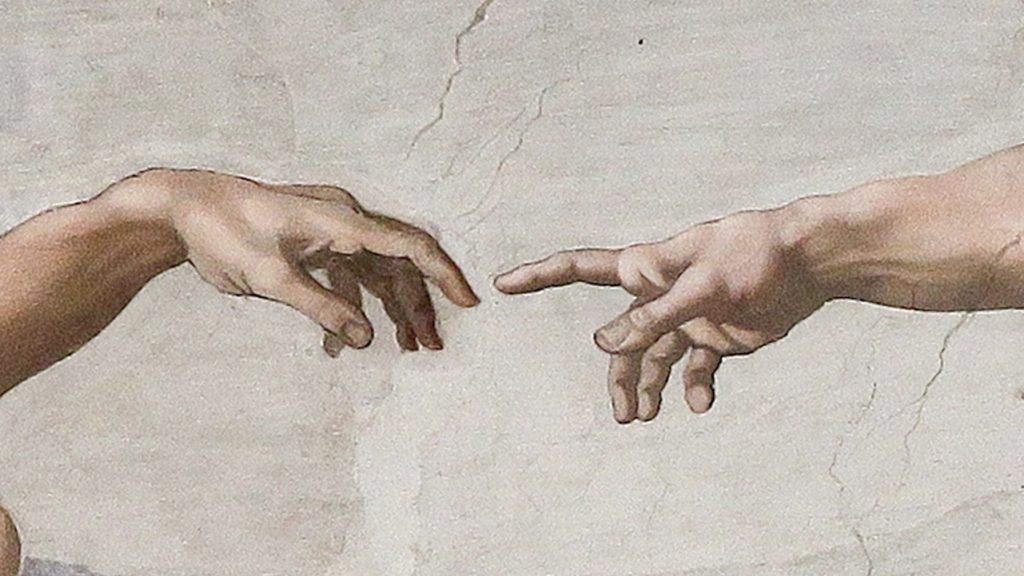We don’t know what Adam called God.
That is because the day came when the heartbeat of Eden stopped — when the relationship was severed, and Adam, once called a living soul, began to die.
I pause and look into the eyes of the audience, men and women and children crammed into church pews, some listening intently, with heads cocked and eyes focused; others blank, unreadable. I am giving the first narration in Father, a small-scale ballet based on the Lord’s Prayer, and I hope these people really hear — that they’re drawn deeply into this drama of Creator and created, of estrangement, reconciliation, provision and hope.
The narration continues, going beyond Eden to Moses, who learned that God is “I AM THAT I AM” — a God far beyond us, outside of our whole sphere of reference.
Because they do not wish to take the name of the Lord in vain, Orthodox Jews often refer to God simply as Hashem — The Name.
My own journey through the Lord’s Prayer began years ago, where this journey usually begins — with the words “Our Father.” Simple words, but how they impacted me. How they still do.
But then, 2,000 years ago, a cluster of men sat around their leader. “Lord,” they asked, “teach us to pray.” And Jesus said, “Our Father, which art in heaven.”
He called Hashem “Father.”
Our Father.
Those two words do more to express what Jesus did for us than any other two words I can think of. He came to bring I AM into our dirty, broken lives. He finished the work of judgment and consequence, giving us mercy in place of punishment. He closed the gap. No more is God distant, untouchable, the inaccessible Name. The Son has come down from the heart of God, drawn us back in with Him, and taught us to pray “Our Father.”
The prayer asks us to hope in a matchless king and His coming kingdom, living every day in reliance on a God who loves us and wants to be involved in every aspect of our lives. It is a revelation. A revolution. And a challenge.
The Lord’s Prayer is simple and concise — seven or eight lines, that’s all — but incredibly rich. Years ago I tried to explore its richness in a book I called Heart to Heart: Meeting With God in the Lord’s Prayer. A year ago, my professional-dancer cousin and I used Heart to Heart as the basis for a ballet production which is now touring for its second summer. Using music, dance, and narration, we try to bring this reality of reconciliation to those who watch and listen.
Jesus did not come simply as a good man to live an exemplary life, or as a teacher to show truth about God. No, Jesus Christ came into this world as Savior and King — to claim the hearts and save the souls of every man, woman, and child who will own Him as Lord.
Born 2,000 years ago, Jesus showed us God as we had never seen Him before. Into our corrosion came healing and life. Into our darkness, light. Those who were rejected, Jesus called adopted. Those who were broken, Jesus made whole. Those who were lost, Jesus found, freely forgiving and renewing their lives.
There’s something about presenting truth in such an overt, all-eyes-on-us way that forces me to ask anew whether I really believe it, whether I accept the challenge. For the prayer is a challenge. It would be one thing if we only went to pleasant little churches where evil never invaded, where “Thy kingdom come” is a platitude and “Deliver us from evil” irrelevant. It’s easy to speak truth when everyone just smiles and nods. But that’s not reality, and it’s not how these tours shape up. Sometimes they take us to difficult places — and then, suddenly, the richness of this prayer breaks over me again, with all its blinding urgency.
When the tour started, we performed for a ministry to street women who may not have any idea what a real father is. We told them about God’s promise of a kingdom come, of a place where “promises always come true” and darkness is invaded by light. Did they really hear? I hope so.
Last weekend we took the Lord’s Prayer to a town where a child has just been murdered.
Her name was Tori Stafford. She was 8 years old. In the tiny town of Woodstock, Ontario, she was picked up by a woman she seemed to know on her way home from school — their meeting caught on grainy, indistinct film by a nearby security camera. After a month of searches, press conferences, rumors and accusations, and community-wide heartbreak, two people were charged with murder and the police proclaimed that Tori wasn’t coming home. The search for a child became a search for “the remains.”
We performed in Woodstock the day before the church hosting us held a funeral for her. Hundreds of women came to the performance. Some knew Tori.
This is the reality of the world in which Jesus spoke the Lord’s Prayer and called us all to trust in Him and challenge the darkness. This is why we need to stand up and speak, to say these things publicly and drive them into the hearts of others — and into our own. In a place like this, reeling with the impact of evil, kingdom come suddenly means so much.
The prophet Daniel wrote, “I saw in the night visions, and behold, one like the Son of man came with the clouds, and came before the ancient of days. And there was given him dominion, and glory, and a kingdom, that all people, nations, and languages should serve him. His dominion is an everlasting dominion which shall not pass away, and his kingdom that which shall not pass away.”
Standing before several hundred women who are dealing so primevally with the reality of evil, with the horrible brokenness of this world as we know it, I could only pray that God would take the loaves and fishes of our presentation and multiply it into something greater — that He would use the power of His word to comfort, convict, and call us all to follow His Christ wholeheartedly.
After the performance, one woman came to me in tears and said, “Thank you so much — I really needed to hear that tonight.”
Our Father, which art in heaven
Hallowed by Thy name.
Thy kingdom come.
Thy will be done, on earth as it is in heaven.
Give us this day our daily bread.
Forgive us our debts, as we forgive our debtors.
Lead us not into temptation, but deliver us from evil.
For thine is the kingdom, the power, and the glory, forever and ever, amen.
Sometimes I get so comfortable with calling God “Father” that I forget how revolutionary it all is. Sometimes I get so happy living here that I forget about the battle — about the reality of Good and Evil that surrounds us, constantly at war, making up the very fabric of my days.
God in His wisdom reminds me through His word. Through the experience of speaking truth before young and old, rich and poor, whole and heartbroken. Through the horrendous reality of evil, the powerful urgency of deliverance, the tremendous hope of His kingdom come.
We who believe and embrace the good news of Jesus are outposts of heaven. We are a new and living world within an old and dying one. It is ours to walk in the light, to live as children of the day, to worship the True King. To the darkness, we are the worst sort of traitors, because we dare to live eternal lives.
And so we pray:
Thy kingdom come.
Copyright 2009 Rachel Starr Thomson. All rights reserved.












